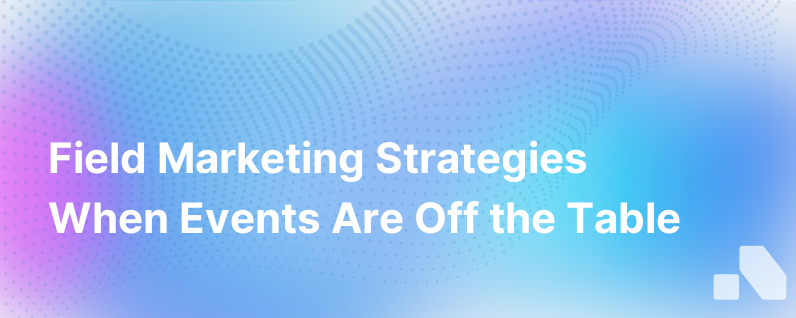
The advent of global disruptions such as the COVID-19 pandemic has led to an unprecedented cancellation of in-person field events. These events, which traditionally have served as cornerstone opportunities for networking, brand promotion, and direct customer engagement, are being reimagined. As a result, field marketing teams are faced with the challenge of pivoting their strategies to remain relevant and effective in this new landscape.
However, this disruption doesn't spell the end for the dynamic and resilient field marketing discipline. Instead, field marketing professionals are finding new, creative ways to contribute value to their organizations. Let's explore the transformed role of the field marketing team when faced with the impossibility of in-person events.
New Horizons in Virtual Events and Webinars
Field marketing teams have been quick to shift their focus from live events to virtual ones, embracing the challenge with strategic pivots to digital platforms. By leveraging technology, field marketers are now curating virtual events and webinars that can reach a broader audience than conventional field events ever could.
Organizing webinars and virtual conferences requires a symbiosis of technologies and engaging content to make up for the lack of in-person interaction. Field marketing teams are now doubling down on Webinar software, crafting interactive sessions, and employing live Q&A segments to maintain audience engagement.
The efficiency of these virtual events is underscored by their ability to track attendee engagement through analytics, generating actionable insights for follow-up marketing strategies.
Content Is King: Repurposing and Amplifying
The content previously used to engage attendees at physical events is being repurposed for digital consumption. Field marketing teams are proving their adaptability by transforming these materials into a mix of insightful blog posts, eye-catching infographics, engaging video content, and even podcasts. These repurposed content formats not only ensure that the investments made in field event planning do not go to waste but also serve to deepen brand storytelling and reach.
Moreover, field marketeers are becoming internal influencers for content amplification, utilizing social media platforms to share and promote content. They've become adept at orchestrating online discussions around these content pieces to foster community engagement.
Nurturing Leads with Personalized Outreach
Without the natural conversation flow that happens at live events, field marketing teams are personalizing their outreach efforts more than ever before. They're leveraging marketing automation platforms and CRM tools to create tailored email campaigns that resonate with specific segments of their audience.
Additionally, the team's deep understanding of customer needs and key accounts is helping to facilitate more targeted and effective Account-Based Marketing (ABM) campaigns. These campaigns, nurtured over time, help maintain a warm relationship with key prospects and customers, filling the gap left by in-person events and potentially increasing conversion rates.
Building Partnerships and Co-Branding Efforts
Field marketers are seizing the opportunity to cultivate co-marketing partnerships, aligning with complementary businesses to pool resources and expand reach. These partnerships may lead to joint virtual events, shared content creation, or mutual promotional strategies that benefit all involved parties.
Collaborations with industry influencers and thought leaders also help brands to maintain a competitive edge. These relationships help in creating engaging webinars, live interviews, and virtual panels that can attract and retain the attention of business audiences.
Community Engagement and Customer Advocacy Programs
Staying connected with the customer base and nurturing a sense of community have emerged as top priorities. Field marketing teams are investing time in building and managing online communities where customers can interact, share experiences, and offer feedback.
Furthermore, robust customer advocacy programs have been developed to highlight success stories through case studies and testimonials, which provide social proof and support sales efforts. Engaging existing customers in such advocacy efforts not only reinforces their loyalty but also provides trusted voices that can influence prospects.
Measuring Impact with Advanced Analytics
With the shift to digital, field marketers are leveraging advanced analytics to measure the impact of their strategies in real-time. By setting up KPIs relevant to digital initiatives, field marketing teams can iterate quickly and improve strategies based on data-driven insights. This has shifted some of the functional focus of field marketing towards a more analytical mindset.
The transformation in analytics has also enabled better alignment with sales by providing them with leads that are qualitatively scored and quantitatively measured. This alignment is a crucial part of the feedback loop that informs ongoing marketing strategies.
Experimentation with Emerging Technologies
Finally, field marketing teams are exploring and experimenting with emerging technologies to innovate in customer engagement. Augmented reality (AR) and virtual reality (VR) experiences are being tested as immersive alternatives to traditional event presentations and product demonstrations. Though in early stages, these technologies hold significant promise for creating memorable brand interactions.
Conclusion
The forced cancellation of field events has become a catalyst for innovation among field marketing teams. These professionals have stepped beyond the confines of physical venues and geographic limitations to embrace a more connected, digitally savvy, and analytically driven approach to marketing.
As field marketing teams continue to adapt and evolve, their efforts will redefine the scope of B2B marketing strategies. They are not simply holding the fort until a return to normalcy; they are actively creating a new normal that is likely to persist and shape future engagement strategies, even when in-person events gradually resume.